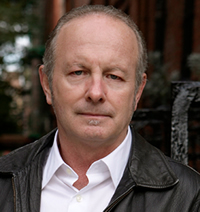MORNING KEYNOTES
OPENING KEYNOTE: The Emotional Brain
 Joseph E. LeDoux, PhD, New York University Joseph E. LeDoux, PhD, New York University
Henry and Lucy Moses Professor of Science; Professor of Neural Science and Psychology, New York University; Director, Emotional Brain Institute, a collaboration between NYU and the Nathan S. Kline Institute for Psychiatric Research (NKI); Author, Synaptic Self: How Our Brains Become Who We Are (2003) and The Emotional Brain: The Mysterious Underpinnings of Emotional Life (1998) |
 Stress, Play and the Learning Brain Stress, Play and the Learning Brain
Sam Wang, PhD, Associate Professor of Neuroscience and Molecular Biology, Princeton University; W.M. Keck Foundation Distinguished Young Investigator; winner of the National Science Foundation Young Investigator Award; Co-Author, Welcome to Your Child's Brain: How the Mind Grows from Conception to College (2011) and Welcome to Your Brain: Why You Lose Your Car Keys but Never Forget How to Drive and Other Puzzles of Everyday Life (2008)
|
 We Feel, Therefore, We Learn We Feel, Therefore, We Learn
Mary Helen Immordino-Yang, EdD, Assistant Professor of Education and Psychology, Rossier School of Education; Assistant Professor, Brain and Creativity Institute, University of Southern California; Author, "Implications of affective and social neuroscience for educational theory" (2011, Educational Philosophy and Theory); Co-Author, "We feel, therefore we learn: The relevance of affective and social neuroscience to education" (2007, Mind, Brain and Education Journal)
|
|
Afternoon Breakout Sessions A: 1:30 PM - 5:30 PM
USING EMOTIONS TO INCREASE STUDENT ENGAGEMENT AND LEARNING
|
 Using Brain Research to Promote Emotional Positivity and Engaged Learning for School Success Using Brain Research to Promote Emotional Positivity and Engaged Learning for School Success
Judy Willis, MD, EdM, Board-Certified Neurologist, Adjunct Lecturer, Graduate School of Education, University of California, Santa Barbara; Author, Learning to Love Math (2011), Inspiring Middle School Minds (2009), Research-Based Strategies to Ignite Student Learning (2006), and "Current impact of neuroscience on teaching and learning" (2010, Mind, Brain ghj_amp Education: Neuroscience Implications for the Classroom)
|

Building Emotional Literacy in Schools
Marc A. Brackett, PhD, Research Scientist; Deputy Director, Health, Emotion and Behavior Lab; Director, Emotional Intelligence Unit, Edward Zigler Center in Child Development and Social Policy, Yale University; Co-Developer, The RULER Approach to Social and Emotional Learning; Recipient, Joseph E. Zins Award for Early Career Contributions to Research on Social and Emotional Learning; Co-Author, Emotional Literacy in the Elementary School (2008) and Emotional Literacy in the Middle School (2004)
|
 Emotional Intelligence in Parenting Emotional Intelligence in Parenting
Robin Stern, PhD, Psychoanalyst; Adjunct Assistant Professor of Education, Teachers College, Columbia University; Consultant, Health, Emotion and Behavior Lab, Yale University; Lead Facilitator and Senior Supervisor, Inner Resilience Program; Member, Emotional Intelligence Consortium; Author, The Gaslight Effect: How to Spot and Survive the Hidden Manipulation Others Use to Control Your Life (2007); Co-Author, Project Rebirth (2011) and "Emotionally Intelligent Parenting" (2007, Educating People to be Emotionally Intelligent)
|
|
Afternoon Breakout Sessions B: 1:30 PM - 5:30 PM
EMOTIONS AND THE TEEN BRAIN
|
 The Emotional Teen Brain: Insights from Neuroimaging The Emotional Teen Brain: Insights from Neuroimaging
Jay N. Giedd, MD, Child and Adolescent Psychiatrist; Chief, Brain Imaging in the Child Psychiatry Branch, National Institute of Mental Health, National Institutes of Health; Co-Author; "Anatomical brain magnetic resonance imaging of typically developing children and adolescents" (2009, Journal of American Academy of Child Adolescent Psychiatry)
|
 The Neuroscience of Teens: Emotions, Risk and Decision-Making The Neuroscience of Teens: Emotions, Risk and Decision-Making
Abigail A. Baird, PhD, Developmental Neuroscientist; Associate Professor of Psychology, Vassar College; researcher focusing on emotion and cognition in adolescents; Rising Star in Psychology, Association for Psychological Science; Author, THINK Psychology (2009) and "Adolescent Moral reasoning: The integration of emotion and cognition" (2008, Moral Psychology)
|
 Teaching to the Adolescent Social-Emotional Brain Teaching to the Adolescent Social-Emotional Brain
Glenda W. Crawford, EdD, Director of Teaching Fellows; Professor, School of Education, Elon University; Author, Differentiation for the Adolescent Learner (2008), Brain-Based Teaching With Adolescent Learning in Mind (2007) and Managing the Adolescent Classroom (2004)
|
|
Afternoon Breakout Sessions C: 1:30 PM - 5:30 PM
AFFECT, ANXIETY AND ACHIEVEMENT
|
 Teaching in the Presence and Aftermath of Stress and Trauma Teaching in the Presence and Aftermath of Stress and Trauma
Janet N. Zadina, PhD, Assistant Professor in Cognitive Neuroscience, Department of Psychiatry and Neurology, Tulane University; Assistant Professor, Department of Psychology, University of South Florida; Researcher on projects at a VA Hospital on post-traumatic stress disorder; Founder, Brain Research ghj_amp Instruction; Author, Six Weeks to a Brain-Compatible Classroom (2008)
|
 The Effects of Stress on the Developing and Adult Brain: Social Environments, Plasticity and Resiliency The Effects of Stress on the Developing and Adult Brain: Social Environments, Plasticity and Resiliency
Bruce S. McEwen, PhD, Alfred E. Mirsky Professor, Harold and Margaret Milliken Hatch Laboratory of Neuroendocrinology, Departmemt of Neuroscience, The Rockefeller University; Former President, Society for Neuroscience; Member, the National Academy of Sciences, the American Academy of Arts and Sciences and the Institute of Medicine; Winner of the Gold Medal Award from the Society for Biological Psychiatry; Author, The End of Stress as We Know It (2002); Co-Author, Social Neuroscience: Gene, Environment, Brain, Body (2011)
|
 Stress, Poverty and Early Childhood: How Experience Shapes a Child's Brain, Self-Regulation Ability and School Success Stress, Poverty and Early Childhood: How Experience Shapes a Child's Brain, Self-Regulation Ability and School Success
Clancy B. Blair, PhD, Professor of Applied Psychology, Department of Applied Psychology, New York University; Developmental Psychologist; Research focus on self-regulation in young children; Author, "Stress and the development of self-regulation in context" (2010, Child Development Perspectives) and "Salivary cortisol mediates effects of poverty and parenting on executive functions in early childhood" (2011, Child Development)
|


 Joseph E. LeDoux, PhD,
Joseph E. LeDoux, PhD,  Stress, Play and the Learning Brain
Stress, Play and the Learning Brain We Feel, Therefore, We Learn
We Feel, Therefore, We Learn Using Brain Research to Promote Emotional Positivity and Engaged Learning for School Success
Using Brain Research to Promote Emotional Positivity and Engaged Learning for School Success
 Emotional Intelligence in Parenting
Emotional Intelligence in Parenting The Emotional Teen Brain: Insights from Neuroimaging
The Emotional Teen Brain: Insights from Neuroimaging The Neuroscience of Teens: Emotions, Risk and Decision-Making
The Neuroscience of Teens: Emotions, Risk and Decision-Making Teaching to the Adolescent Social-Emotional Brain
Teaching to the Adolescent Social-Emotional Brain Teaching in the Presence and Aftermath of Stress and Trauma
Teaching in the Presence and Aftermath of Stress and Trauma The Effects of Stress on the Developing and Adult Brain: Social Environments, Plasticity and Resiliency
The Effects of Stress on the Developing and Adult Brain: Social Environments, Plasticity and Resiliency Stress, Poverty and Early Childhood: How Experience Shapes a Child's Brain, Self-Regulation Ability and School Success
Stress, Poverty and Early Childhood: How Experience Shapes a Child's Brain, Self-Regulation Ability and School Success